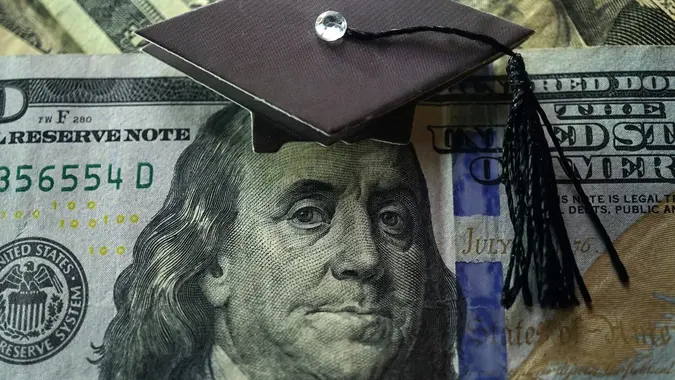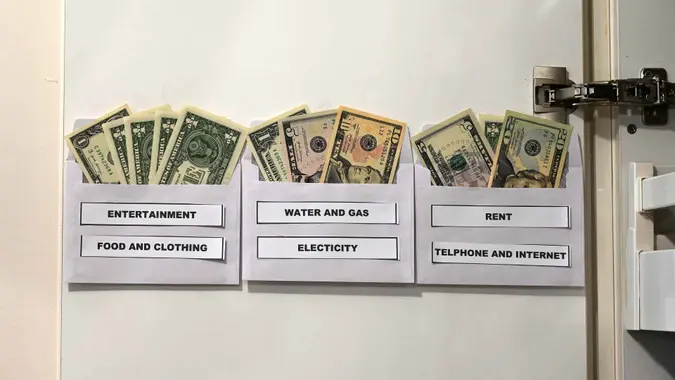Are Ivy League Schools Worth the Cost? Experts Weigh In

Commitment to Our Readers
GOBankingRates' editorial team is committed to bringing you unbiased reviews and information. We use data-driven methodologies to evaluate financial products and services - our reviews and ratings are not influenced by advertisers. You can read more about our editorial guidelines and our products and services review methodology.

20 Years
Helping You Live Richer

Reviewed
by Experts

Trusted by
Millions of Readers
Following the college admissions scandal of 2019, the media spotlight shone on the dubious practices of elite universities, revealing that some may be more interested in family money than in the integrity and aptitude of their applicants. But the question of whether Ivy League schools are any better than other private and state-run colleges has been a hot topic long before these ugly truths were shown.
Is College Really Worth It? A Look at the Grim Reality for Student Loan BorrowersFind Out: Which Degrees Are Still Worth the Investment?
So, what is the answer? Are elite universities worth their hefty price tags? What are the pros and cons of attending Yale or Harvard or any other of the top-tier institutions?
GOBankingRates consulted education experts to learn the insider’s perspective.
Take a Look: Explore the Cost of Education in the United States
The Biggest Sell? The Public Perception
“Elite schools are elite because people believe they are elite,” said Antonio Cruz, a mentor with Ivy Scholars. “The perception of peers is one of the key components of the U.S. News ranking.”
On top of this, the best ranked schools also have some of the highest endowments, giving them incredible financial resources, Cruz noted.
Parents want their students to attend these lofty colleges for good reason: they want their kids to have the best chance at success after college.
See: Where Jeff Bezos, Elon Musk and 49 Other CEOs Went To CollegeLearn: 15 Rich Influencers Who Didn’t Need a College Degree
“Attending a school with a recognized name provides a measurable boost when searching for jobs, and the networking opportunities at the school are also enhanced,” Cruz said.
“I have worked with hundreds of families and while local State U may be a great school, elite schools are the only ones that elicit ‘ooohs’ and ‘aaahs’ from friends and family,” said Jack Wang, college aid strategist and wealth advisor at Innovative Advisory Group. “After all, most families can’t define what a ‘good’ college is. In the absence of measures, families go towards brand names that are recognized by everyone, such as Ivy League schools.”
Factor in the prestigious faculty, the famous alumni and the beaming pride of being able to say, “My kid went to the best school,” regardless of its veracity, and it makes sense why elite schools are so darn appealing. But there are detailed pros and cons to attending elite universities.
Let’s first take a look at some of the pros:
Pro: Most Elite Colleges Are Need-Blind
“Elite colleges are almost all need-blind (meaning they don’t consider a student’s ability to pay) and are committed to meeting 100% of demonstrated need,” Cruz said. “Thus, a school which charges $60,000-$70,000 for tuition, room and board, like Harvard or Yale, could end up costing nothing.”
Read: The Top Colleges with the Most Financial AidSee: 6 Common Mistakes to Avoid When Filling Out Your Federal Financial Aid Form
Pro: Students Have Access to People From All Over the World
“Students are more likely to meet other students from around the globe due to international parents willing to pay to attend private U.S. colleges,” said Leo Sanada, CEO and founder, WeAdmit. “This will help to grow domestic and international student experiences and understanding of other cultures and ideas. This also contributes to networking with alumni that may contribute to their future success in their career post-college.”
Pro: The Reputation Goes a Long Way
“Elite schools hold respected reputations,” said Daniel Santos, CEO of Prepory. “After graduation, your chances of being hired at reputable companies and/or organizations are much higher.”
Now, let’s review some of the cons.
Con: Social Pressures To Spend More
“I often explain to prospective elite college students and their families that they need to carefully consider the social pressures on campus in addition to looking at academics and tuition,” said Steven Roy Goodman, an educational consultant and admissions strategist. “These social pressures can become additional financial pressures as students feel compelled to keep up with expensive campus and off-campus lifestyles.”
Con: The Looming Debt
“Both bachelor’s degree holders and those with graduate degrees say their biggest regret [was] taking on any debt,” said Christie Barnes, author of What Every Parent Needs to Know about College Admissions. “With debt, you have to take the first job that comes along to pay the debt. Changing jobs is more difficult with debt to repay, and debt [also may] delay buying a house, starting a family, [etc.].”
Check Out: A Look at Americans’ Student Loan Debt by StateGot Debt?: How To Fight Back Against Student Loan Debt
Con: Where’s the Proof?
“There’s no real evidence to suggest that elite schools provide any better level of education than ‘normal’ private or even some public schools,” said Faisal Nasim, director at Exam Papers Plus “In fact, most research suggests that attending schools with a more mixed group (which elite schools most certainly are not) actually better educates children and prepares them for the world outside.”
How To Know What’s Right for Your Family
If you’re not rolling in dough, you’ll want to first sit down and work out a few things before launching into a decision about whether an Ivy League education is worth it. You should also take into account a few bigger picture factors.
“Before applying to college, families should know their Student Aid Index (SAI) number,” said Rachel Coleman of College Essay Editor. “This was formerly called Expected Family Contribution (EFC), but the Department of Education just changed the FAFSA rules this year as part of the second COVID relief bill, and this name was one of the things that changed.”
Check Out: How Gen Z Plans To Avoid Student LoansDiscover: How To Ask Your College for More Financial Aid
Families can calculate this number here.
“Now, if the SAI number is a ‘good’ number for families, i.e. a reasonable number that parents are comfortable paying each year, then students should apply exclusively to colleges that meet 100% of demonstrated financial need,” Coleman said. “For my low-income students, this number is typically $0, and therefore a ‘good’ number for them.”
Here is a list of schools that meet total need. “At any of these elite colleges and universities, parents will only pay that SAI number, no matter where the student is accepted,” said Coleman.
It’s All Subjective
Ultimately, whether you or your kid should apply to or attend an elite university is a personal and subjective decision. Student debt in America is one of the biggest hurdles young people have to navigate. In light of this, it’s important to look past the sparkle and sheen of top-tier schools and get down to the brass tacks of your own situation and what makes the best sense for your wallet — and your future.
- What Money Topics Do You Want Covered: Ask the Financially Savvy Female
- Can You Afford Education in America at These Prices?
- Nominate Your Favorite Small Business To Be Featured on GOBankingRates
- 10 Reasons You Should Claim Social Security Early
Last updated: Sept. 17, 2021
 Written by
Written by  Edited by
Edited by 

























